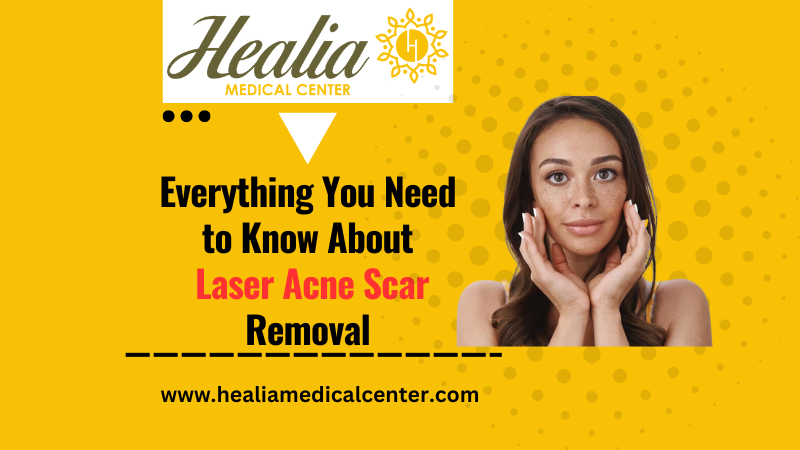Menu
Acne scars can be distressing, affecting both appearance and self-esteem. Laser acne scar removal offers a groundbreaking solution in skincare technology. This guide explores the process, benefits, and critical considerations for those seeking practical solutions.
Laser acne scar removal is a non-invasive cosmetic procedure that utilizes focused laser beams to target and eliminate scar tissue caused by acne.
The process involves using high-energy light to stimulate collagen production, promoting skin regeneration and reducing the appearance of scars.

Laser treatment for acne scars operates in two ways.
Firstly, it removes the top scar layer, revealing smoother skin and reducing scar visibility.
Secondly, the heat and light stimulate the growth of new, healthy skin cells, diminishing redness and promoting overall skin healing. This process results in scars appearing smaller and less raised.
Dermatologists have crafted various laser treatments to address unique acne scar concerns. We can identify the most effective solution for your scars. Here are some common laser treatments:
Ablative lasers for acne scars employ a precise light wavelength to target the skin around the scar. By removing the outer layer, new skin grows, resulting in a smoother, scar-free appearance.
Healing typically takes about two weeks but is less effective for severe scars. Commonly used lasers include CO2 and Nd: YAG.
Non-ablative lasers operate beneath the skin’s surface, avoiding contact with the outer layer. They stimulate collagen production, aiding natural healing and cell regeneration.

Ideal for dark skin types due to a lower risk of hyperpigmentation, this treatment, using infrared lasers, addresses atrophic and hypertrophic scarring and post-inflammatory hyperpigmentation.
Fractional laser skin resurfacing, a non-ablative treatment, employs dispersed light columns targeting specific areas while leaving surrounding skin intact.
Ideal for thick, bumpy, and depressed scars, it reduces pigmentation and stimulates collagen production.
The resulting collagen helps elevate skin depressions, creating a smoother blend with the surrounding skin.




A single laser session lasts 60-90 minutes, and noticeable improvements in scarring and pigmentation become visible within 7-10 days after the treatment.
Multiple sessions, especially with non-ablative lasers, are typically necessary for complete and long-term results in acne scar removal.
The number of sessions varies based on the severity, extent of scars, type of laser selected, and intensity of the laser, which also influences healing time.
Ablative lasers may yield results after one treatment, while IPL lasers typically require 3-4 sessions spaced a month apart.
The sensation of the laser on the skin varies with settings but is generally tolerable.
The cosmetic surgeon applies a numbing cream 20 minutes before the procedure.
Common side effects of laser acne scar treatment include:
Discussing your risk factors with your doctor before proceeding with treatment is crucial. Contact your provider promptly if you experience pus, significant swelling, or fever after the procedure.
For effective and painless laser treatment for acne scars in Dubai, contact Healia Medical Center. Her state-of-the-art laser treatments cater to individual skin types and scar severity.
With expert guidance in dermatology, she ensures safe and efficient removal of acne scars.
All content and media on this page are created and published for informational purposes only. It is not intended to be a substitute for professional medical advice and should not be relied on as health or personal advice. Meet Dr Mustafa Aldam personally for appropriate medical diagnosis and advice.
Where personal respect and exceptional results are ensured. Visit us for truly complete care, offered through non-invasive and minimally invasive treatments, and ascertained by some of the top specialists in Dubai.
Office No. 4, Level 1, Indigo Building 7, Al Manara, Sheikh Zayed Road, Dubai,United Arab Emirates
©Copyright At Healia Medical Center 2025